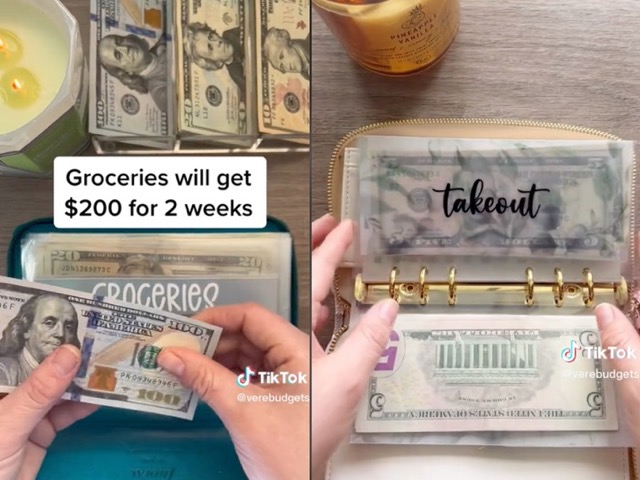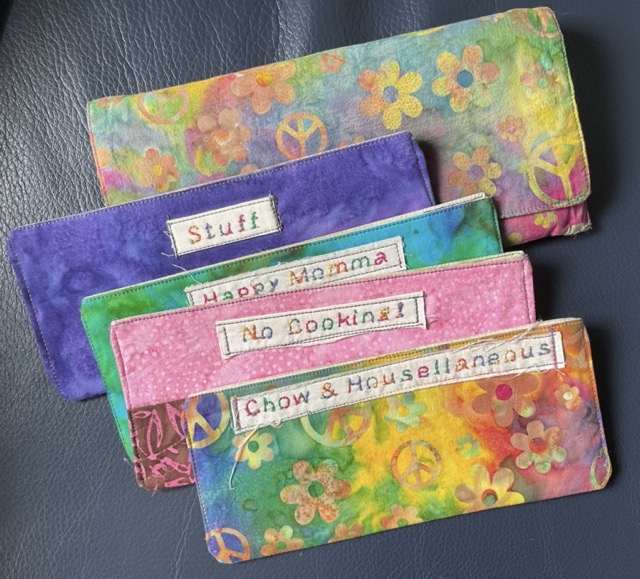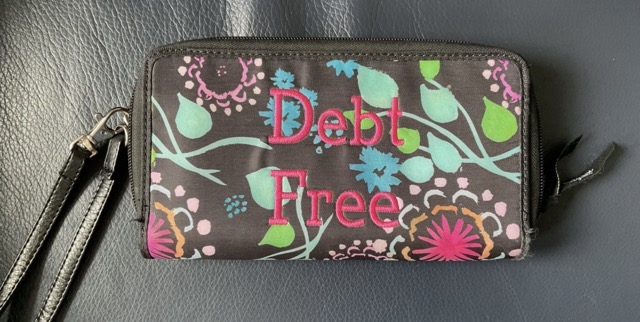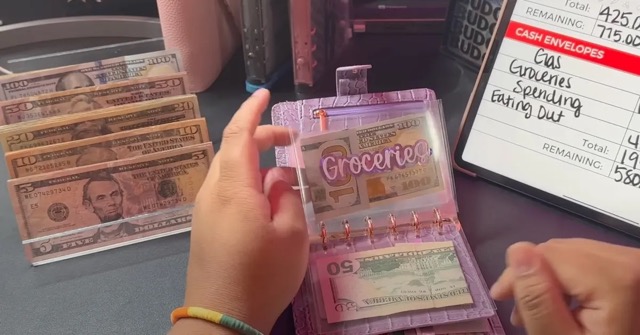“Struggling to effectively budget? Cash stuffing is more than the latest TikTok fad…it’s a great idea that’s been proven for generations.”
One of the hottest things on social media financial space in 2023 is “Cash Stuffing” with nearly 100M views. For those who are curious, it’s the act of converting your paycheck to cash and allocating it among a variety of envelopes according to your budget. Gen Z has embraced this to a degree many thought impossible and numerous content creators post online videos of them doling out Benjamins into a variety of envelopes. Many of these folks also run cottage businesses selling decorated envelopes, binders, charts, and stickers to help folks apply and focus on the practice.
If you’re a Gen X or elder Millennial, this sounds quite a lot like Dave Ramsey’s “envelope system” from the 1990s. Even today his daughter, Rachel Cruze, sells a compartmented wallet to segregate your cash if ubiquitous white office supply store envelopes won’t scratch the itch. Older than that, and it sounds a bunch like a system promoted by Larry Burkett from the 1970s until his death in 2003. Your great (or great, great) grandmother, if she’s still around, might recall a variety of articles in magazines promoting something very similar. Here’s an example from The Evening World of New York’s thrift campaign all the way back in 1916 describing what was apparently already a common practice.
sTo the Thrift Editor of The Evening World: “Like most of your correspondents I, too, divide my money systematically – putting aside in envelopes money for my various expenses. Without some such system saving is practically impossible – what you save in one instance flows out unnecessarily in some other way.”
The New York Tribune ran a fictional story two years later called Find Out What’s In Your Envelope describing an instructional exchange between friends promoting the practice as a budgeting technique.
Well, began Marie, “the important thing about it is that it is a plan. Spending my week’s salary isn’t a helter-skelter, chance affair with me anymore. I know when I get my pay envelope just exactly what’s in it. There’s first of all, so much for board and room, and a definite sum for lunches and carfare; then there’s so much each week for clothes, so much for savings and my weekly contribution to church and charity; and, last of all, there’s my ‘general’ fund. I manage to do as many as I can of the things I really want to do. Some weeks it’s almost a ‘pleasure’ fund, though at times, of course, incidentals take the biggest portion of it.”
“But does it mean keeping accounts and getting balances and writing down every last cent you spend?” asked Lillian.
“It does not! If it did, it would never do for me. I couldn’t be bothered,” said Marie. “I use six budget envelopes. Every week when I get my pay envelope, I have my money changed into small bills, and before I spend a cent I slip into each of these envelopes the amount of money that belongs to each. It took me a few weeks to find out just what amount to set aside for my various needs, but I worked it all out in surprisingly short time and now I stick to my budget as you’d follow a blazed trail after you’d been lost a couple years in the woods!”
And six months later it was the thriftless Lillian who was passing on to a friend that little budget plan. “The envelope method is the only way to do it,” she said. “And it’s so much easier, when you know what’s in your pay envelope, to get what you want out of it.”
The fact such a system was already widely practiced that early says quite a lot since the modern envelope in America had only been on the market since 1860s.
In an era where most people’s money is strictly digits on a screen or in an app, why would anyone want to go through the trouble of counting cash between a bunch of envelopes? In short, because it just works.
By its very nature money is fungible, which means that dollars are alike and completely interchangeable. The dollar you use to pay the rent or buy groceries can be used on vacation or down at the bar. While that’s a feature, not a bug…it does present challenges to newbies in the world of budgeting who often attempt to manage all their expenses from a single bank account. The rent money or the light bill money invariably gets spent on something else leaving the hapless budgeter short of funds when the bill comes due. It is the entire reason the payday loan industry exists in the magnitude it does.
In the modern era, the prevalence of digital payment systems makes money something else as well: intangible. Most Gen Z and Millennials don’t walk around with much (if any) cash on them at all. Finances are just numbers on a screen that are somewhat detached from reality. Numerous studies have shown that people spend cash money and digital money very differently and the transactions register very differently in the brain. It goes without saying, cash spending tends to be more conservative than digital spending across all incomes and cultures.
Managing your cash via segregation does a couple of very handy things for you whether you’re 15 or 115, regardless of what you call it.
- The first is that it makes fungible cash mentally non-fungible. Taking cash out of the rent envelope or the utilities envelope for other uses has an immediate psychological warning siren. Your brain will equate blowing the rent money with sleeping in the street, making you less likely to do so.
- The second is that it makes your money tangible. A fat wad of bills has a different sort of gravitas than numbers in an app. The bigger the bill, the greater the effect.For example, many people can carry a single $100 bill in their wallet for weeks: but the second it’s broken into $20s and $10s…it’s gone. The smaller bills feel less important despite the cumulative amount being the same.
I always recommend that people struggling with budgeting use some version of the envelope system (by any name they’d like) since it gives them an appreciation for what they’re trying to accomplish from within a digital system that makes it harder, not easier, to accomplish. My wife and I used the envelope system to great effect for years until our financial maturity finally allowed us to manage our money virtually. Although our current budgeting system is now entirely digital, we still segregate funds electronically depending on what it’s to be used for.
Struggling to effectively budget? Cash stuffing is more than the latest TikTok fad…it’s a great idea that’s been proven for generations.




